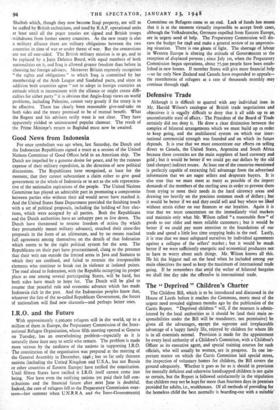I.R.O. and the Future
With approximately 1,500,000 refugees still in the world, up to a million of them in Europe, the Preparatory Commission of the Inter- national Refugee Organisation, whose fifth meeting opened at Geneva on Tuesday, has an overwhelming problem—especially as it is naturally those least easy to settle who remain. The problem is made more serious by the tardiness of the nations in supporting I.R.O. The constitution of the organisation was prepared at the meeting of the General Assembly in December, 1946 ; but so far only thirteen nations (including the United Kingdom and U.S.A., but not Russia or other countries of Eastern Europe) have ratified the constitution. Until fifteen States have ratified it I.R.O. itself cannot come into being. Nor have even the ratifying nations yet paid their full con- tributions and the financial future after next June is doubtful. Indeed, the care of refugees fell to the Preparatory Commission over- soon—last summer when U.N.R.R.A. and the Inter-Governtnental Committee on Refugees came to an end. Lack of funds has meant that it is at the moment virtually impossible to accept fresh cases, although the Volksdeutsche, Germans expelled from Eastern Europe, are in urgent need of help. The Preparatory Commission will dis- cuss the budget for 1948 and make a general review of an unpromis- ing situation. There is one gleam of light. The shortage of labour in Western Europe is altering the attitude of Govermnents to the reception of displaced persons ; since July 1st, when the Preparatory Commission began operations, about 77,500 people have been estab- lished in new homes. If member States will give more financial help —so far only New Zealand and Canada have responded to appeals— the resettlement of refugees at a rate of thousands monthly may continue through 1948.






























 Previous page
Previous page